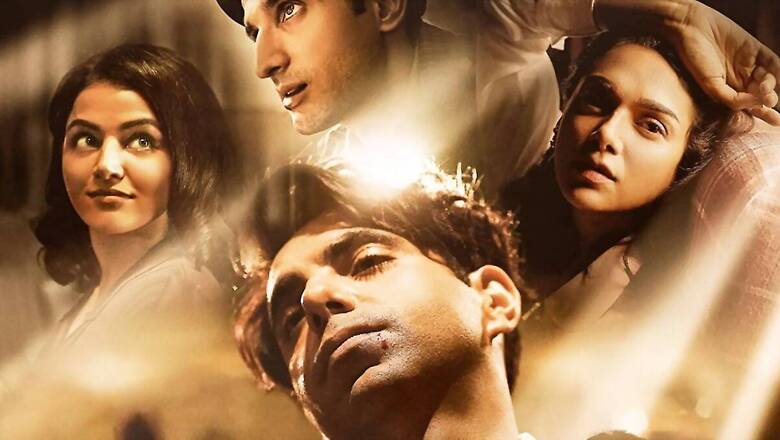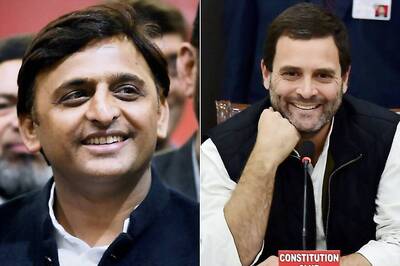
views
Glamour. Jealousy. Fragile egos. Insecurity. Blinding arc lights. Overnight successes. Dramatic downfalls. Histrionics. Heartbreaks. Scandalous love affairs. Unfathomable stardom. Gossamer dreams. Power. Movies. Magic. Show business is sometimes all of that and sometimes, more of that. This is an industry like none other. Fortunes change every Friday. Old ones fade away and new stars are made every week. Box office numbers might be the ultimate sculptor of density but emotions, messy and egregious, in galore, are not left far behind.
The big fat Bollywood magic has seduced many even on the other end of the celluloid for decades. Even carpers and detractors will know the first Hindi film ever made, the first talkie film in Bollywood, the number of years late filmmaker K Asif put into making the magnum opus Mughal-e-Azam (1960), the Raj Kapoor mania in Russia and the melodrama that engulfed filmmaker and actor couple Himanshu Rai and Devika Rani’s personal and professional life. One movie fanatic named Vikramaditya Motwane, also an acclaimed filmmaker, has now channelled all his love, passion and obsession for cinema into Amazon Prime Video’s original series, Jubilee. As the same suggests, it provides a generous glimpse into everything that the bewitching world of Bollywood still stands for – megalomania, magnanimity and magnificence.
In 1934, Rai founded the first public limited film company of India, The Bombay Talkies Limited. In what seems to be loosely based on the lives and times of Rai and Rani, Jubilee opens with the architect of Roy Talkies, Srikant Roy, who’s also an ambitious and visionary businessman. He is driven by his love for filmmaking and is on the lookout to introduce the next big superstar of Hindi cinema ‘Madan Kumar’ opposite his wife, Sumitra Kumari, the lady superstar of the golden era and other half of Roy Talkies.
But Sumitra is in love with the sought-after theatre actor Jamshed Khan and is a caught in a whirlwind romance with him in Lucknow. Srikant sends his right-hand and trusted ally Binod Das, also an aspiring star, to fetch them, who are all set to star in the studio’s next release. While in Lucknow, Binod meets Jay Khanna, a young and philandering playwright, who is also on a journey to take Jamshed along with him for a play he’s directing in Pakistan. While Binod and Jay strike a friendship, their plans go awry when Jamshed suddenly goes missing as Sumitra keeps waiting for him as they had planned on eloping and starting a new life away from all the gloss and glam. The next thing you know, Binod becomes the next ‘Madan Kumar’.
Set against the backdrop of the India-Pakistan Partition in the decades of 1940s and 1950s, Jubilee also gives a sneak peek into Jay’s life and how he is forced to come to India as a refugee with his family after his theatre in Pakistan gets burned down by extremists. Running parallel to this is the story of Niloufer Qureshi, a stunning courtesan, who also ends up in the big, bad world of Mumbai. An aspiring heroine, she captures the imagination of an influential and money-minded film financer, Shamsher Walia, who makes her his paramour. How their lives and emotions intersect amid the themes of Partition and Bollywood that breaks and makes them form the rest of the narrative.
The very first slate of Jubilee sets the tone of the story. We get to see the credits rolling in a fashion that reminds us of the black and white era of Bollywood. Throughout the show, there may be multiple narratives running parallel to each other but Motwane deftly and generously establishes each character, their flaws and their strengths without wasting too much time. In fact, a whole lot of credit goes to the writers of the show – Motwane, Atul Sabharwal and Soumik Sen – for fleshing out the nuances of every role with finesse. While most of these characters may be quintessential prototypes of people that form of a part of the very hierarchical film industry, they are deeply humanised and we get to see them up, close and personal behind their deified and glorified images.
For a show that time travels and is set in a certain period of the yesteryear, what perhaps becomes more important than anything else is its set design, art direction and costumes. And Jubilee aces all these aspects. The sepia-tinted splendour of Kolkata, Lucknow and Mumbai have been captured with aplomb. The Bombay created by Motwane and his team might instantaneously remind you of the Bombay sketched by his friend and ally, Anurag Kashyap and his team in Bombay Velvet (2015). Each frame looks like a beautifully oil-painted vignette on a textured canvas and has romance, forbidden and vivacious, written all over it. There is also an ode to the iconic scene from Shree 420 (1955) where Raj Kapoor and Nargis Dutt romances under an umbrella against the backdrop of a rain-soaked Bombay. In another scene, we see the camera romancing the radiant Qureshi poetically singing and dancing in a club, which also pays homage to several old classics.
Though times were different back then, we are reminded that not much has changed today. In a key scene, Binod says, ‘Film industry mein jo chup rehta hai woh lamba chalta hai.’ Despite the hero worship, film stars are still frowned upon on voicing their opinions. And most opportunities that open up before you is in exchange of something that costs you dearly. Sumitra’s silent protest as a female actor and businessperson, the tumultuous relationships she shares and the struggles of being a leading lady in an industry that doesn’t quite regard the female voice and mind deeply resonates with the modern world of show business that is largely tainted by social media.
But for a period drama on Hindi cinema that also focuses on the shift towards actors lip-syncing to recorded vocals, the music of Jubilee doesn’t quite strike a chord. While the picturisation is stunning and immaculate, the songs don’t really stay back with you. Perhaps, that’s also because music composer Amit Trivedi has set the standard too high with his compositions in Bombay Velvet and Qala (2022) – two films also set in and around an era similar to Jubilee.
Though Jubilee serves as quite a perfect ode to yesteryear Bollywood on paper, Motwane plays it safe. A lot of attention is paid to the opulent sets but more often than once, you don’t get the luxury of investing yourself in the story. The narrative is linear and sometimes, quite run-of-the-mill, and lacks the power to keep you engaged. Nostalgia – though beautiful and heartfelt – alone is not enough to drive a plot. You do feel for the characters and the upheavals they experience but only till an extent.
Prosenjit Chatterjee as Srikant is impressive and conveys his ruthlessness to a T. Aditi Rao Hydari’s Sumitra seems to get side-lined amid all the drama that unfolds. Having said that, she brings a rare grace and dignity to the table and lights up every scene with her silent resolution. Aparshakti Khurana as Binod delivers a class act and proves that given a tough role with multiple emotional graphs, he can ace them with a striking ease. Nandish Sandhu and Ram Kapoor as Jamshed and Shamsher, respectively, are equally good.
But it is the young actors Wamiqa Gabbi and Sidhant Gupta, who steal the show. And that’s also because they have two of the most well-written characters to their credit. Wamiqa’s Niloufer is unpredictable, enterprising and effervescent. Her pain is palpable and she slips under the skin of her character like a seasoned artist. Her vintage looks also make her the perfect fit for the role and help her nail the part. Her scenes with Sidhant’s Jay are pure gold and stay back with you. Jay might be impish, carefree and easy-going but is equally ambitious and fearless. Sidhant plays the part with an impressive rawness and it would be no surprise if he emerges as the next big thing.
Go for Jubilee if you’re a true-blue cinema lover. While it may not leave you in complete awe, it will nudge you to rejoice and indulge in the good old Bollywood charm, that has brightened up our gloomy days and inspired us to dream big. Besides, we don’t mind a little bit of a scandal here and there, do we?
Read all the Latest Movies News, Entertainment News




















Comments
0 comment